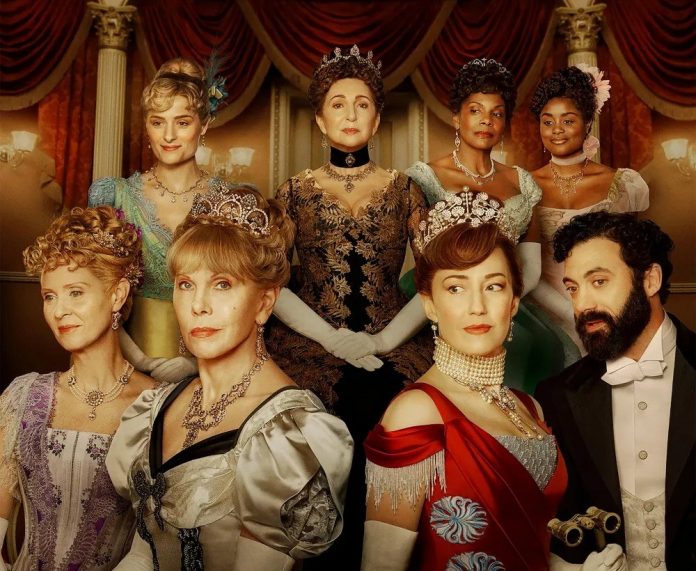As American history goes, the HBO series The Gilded Age stands out as a time of immense development and change. Now in its second season, creator Julian Fellowes expands that theme, zeroing in on the societal conflict between old money New Yorkers and the new money millionaires making their claim into the city’s high society. Excess is valued, and greed and corruption by wealthy industrialists, business owners, and politicians take center stage in the series. If this sounds familiar, then you would agree with writer and co-executive producer Sonja Warfield (Will & Grace, The Game, Zoe Ever After, She-Ra, Jake in Progress) that, as far as we’ve come in the past 140 years, much has stayed the same.
Warfield had to educate herself in the time period, circa 1883, writing storylines steeped in historical fact. There was the construction and design of the Brooklyn Bridge, credited to Emily Roebling, the wife of designer John Roebling, and the Opera Wars pitting the Metropolitan Opera against the Academy of Music, with madams Bertha Russell (Carrie Coon) and Mrs. Astor (Donna Murphy) vying for coveted boxes. Working with a team of consultants for accuracy in such areas as old language and societal mores—even learning the proper placement of where a man stands beside a woman when walking along the dusty streets—proved invaluable to Warfield.
Above The Line spoke with Sonja Warfield via Zoom video on receiving the green light from Fellowes in season two to give several of the beloved characters their due. Spinster Ada Brook (Cynthia Nixon) is married off to Reverend Forte (Robert Sean Leonard), as well as sending journalist Peggy Scott (Denee Benton) on assignment to cover the historic opening of the Booker T. Washington school in Tuskegee, Alabama—an actual achievement during that time. A former debutante, Warfield tapped into the coming-of-age experience celebrated in the series.
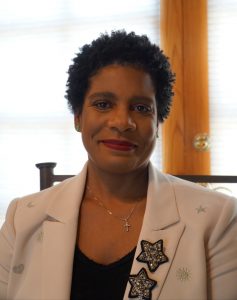
Above The Line: This season is even more fabulous. How did you sort of up the ante in Season Two? What were some of the things that you wanted to expand upon in the season?
Sonja Warfield: Oh, bless you. Thank you. That’s so kind. I love Cynthia Nixon, and her performances just really inspired me. I really wanted her to have love this season, and I wanted her to feel empowered and to have life beyond Agnes (Christine Baranski), who can be oppressive. I wanted more for Ada’s character. We came up with that storyline, and it just all falls together, and history meets us in wonderful places.
ATL: What other storylines were written with historical accuracy?
Warfield: I work closely with our main historian, Dr. Erica Dunbar. Julian really wanted Peggy to have a story where she was going out and doing real journalism. I talked to Dr. Erica Dunbar about it, and she said, “Oh, this is the same time that Tuskegee was being built, and T. Thomas Fortune and Booker T. Washington would have been in each other’s orbits.” Then she found this wonderful nugget: that there was in fact a big New York donor who donated that dormitory to the school. I told Julian that, and he’s like, “Great!” And then we put it together, and we were very excited about that storyline. The Opera Wars really did happen, and people are bewildered because they never heard of the Academy of Music. Julian always wanted to do that. The Big Opera Wars story Then we have everything that’s going on in the world, and then the Brooklyn Bridge. That was also a real story that he wanted to expose, because the husband (John Roebling) was infirmed and the wife really did take over the project. Julian always says that if I can get people after they’ve watched an episode to look it up on Wikipedia, then we’ve done our job.
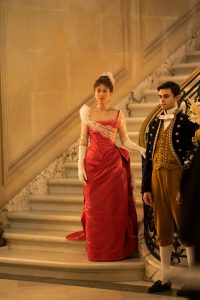
ATL: Yes, I’ve done a lot of looking up in Wikipedia. What I read about you, which I find fascinating, is that you were a debutante. How did that play into the coming-of-age storyline with Gladys Russell, played by Taissa Farmiga?
Warfield: I took the lessons and everything. I was a reluctant debutante. My mother made me do it. I grew up in this kind of affluent area in Ohio, and so my friends were debutantes too. I was in a black elite debutante group, and I had a couple of friends who were in other black elite balls. Then I had friends who were white, and they were very, very segregated, even in the late ’80s. So yes, I know how that world works to some extent. I had friends’ moms who were in the junior league growing up, and my mom was president of a black organization that was similar, so that’s the world that I’m familiar with.
ATL: I’m also wondering if your experience of writing for Will & Grace gave you much more of a sensitivity to the gay experience which you explored in the first season with Oscar.
Warfield: Oscar is on a whole different trajectory for the second season, and my goodness, does he spoil some things? I don’t know if that’s true. I mean, I try to write for human beings, so it doesn’t matter who you love or what color you are; you’re a human being; we all have depth, complexities, and feelings when it comes down to it. That’s what I like about the show: Oscar could not be himself back then, Peggy and her family could not go through the front door, and there were all these rigid rules in society, yet these are all human beings. So I like to write about humanity.
ATL: Of course, this story is so much about the haves and the have nots and that was so big back then during ghe Gilded Age. Has much changed in society?
Warfield: Well, it’s astounding to me. I read a statistic just the other day that the 1 percent has the same amount of wealth as the entire middle class in this country. I was thinking about this the other day because the Gilded Age people were riding high in the hog and not paying taxes or whatever, and then the crash came. I mean, the stock market’s doing well, but that’s a big gamble. So who knows what’s going to happen? Anything’s possible. But as much as times have changed, they’ve stayed the same. I can say that even with issues of race, gender, and LGBTQ, we still have problems.
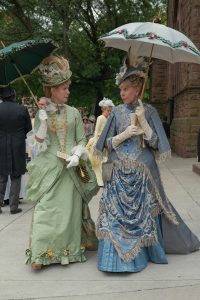
ATL: That we do. I want to break down some of the departments that you work with as exec. producer, starting with the costumes, which are to die for.
Warfield: Kasia [Walicka] is amazing. What was really interesting was how the pandemic affected her work, because they were going to shoot and then everything had to shut down, but they were still having fabric and things flown in from Europe and other places. She and all the costume people were at home sewing during the lockdown, so it actually gave them extra time. It gave everyone some extra time, which had an impact, but I think that’s really interesting, because often on television we’re always racing. Television is pretty fast-paced as opposed to the glacial pace of feature films. I think this allowed everyone to slow down. Imagine the details that she probably added, the colors that she found, and the fabrics she found just being at home and having nothing else to do but that. Julian and I were rewriting all that stuff too. I just think it was horrific, obviously, but there was a little gift.
ATL: Speaking of a little gift. I think you use Broadway’s finest casting them in the series because they were all out of work essentially during the pandemic.
Warfield: Well, that was Executive Producer Michael Engler. That was his idea, because he said we have this plethora of amazing talent right at our fingertips who are sitting at home twiddling their thumbs, so let’s use them.
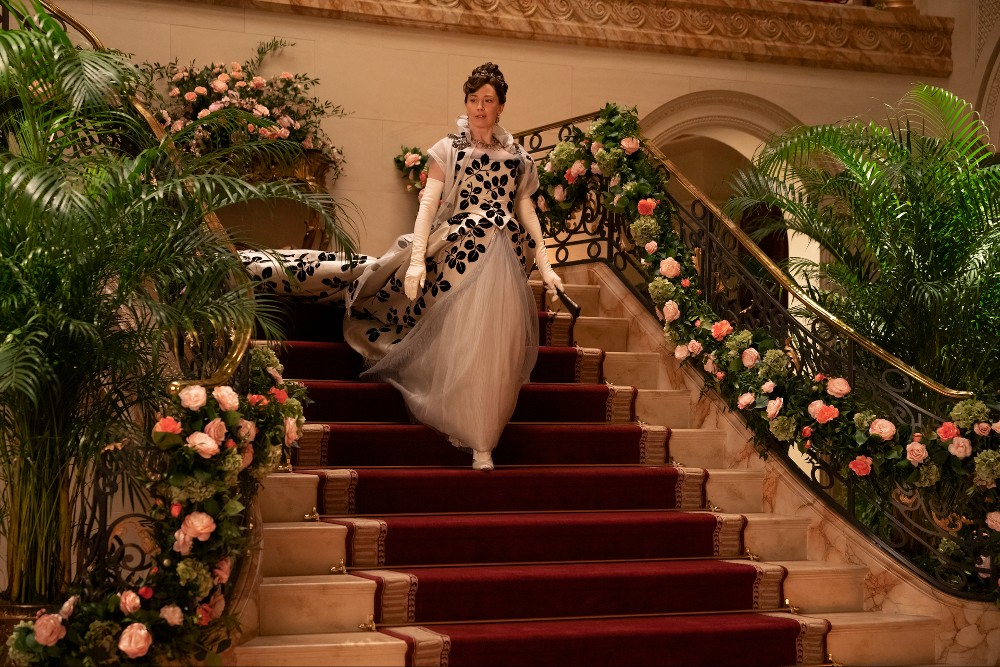
ATL: What about the production design and the stunning sets?
Warfield: Well, you should interview Bob Shaw, because he’s a genius, and he won an Emmy for the sets. The first time that I walked into Bertha’s house, I thought I was at Versailles. I mean, I’ve been to Versailles, but I was transported. When I walked down that staircase, I felt like a debutante again. I didn’t even enjoy being a debutante. So this was my second chance. That’s the thing about Julian: he has this knowledge of the period, and everything has to be precisely right. If it isn’t, your disbelief is no longer suspended. I remember watching something, and I said it to one of the directors, just because I’ve become hyper-aware of it now. This is something my dad taught me: the man always walks outside of the lady on the street; if something like the carriage goes off the road, they get hit first. So I noticed in a shot that that wasn’t happening, and I remember saying that to the director.
ATL: Who steers you in the right direction?
Warfield: We have etiquette people, we have historians, and we have a dialect coach. If you think about linguistics, they have changed so much. I remember I wrote the scene, and I wrote the word “strategize,” and Julian said they didn’t have those contractions back then, so we had to change it. It’s just the smallest things that make the difference and put you back in that time period.
ATL: That’s interesting, because I was going to ask you how you write for old language. How do you get into that mode?
Warfield: I hang out with Julian Fellowes. [laughs] It’s funny, because I’ve been on the set before, and we all sort of take on that air. We’d start to speak the language. It’s almost like if you’ve ever gone to France for a period of time, you’re suddenly speaking Franglish or something. So it just happens. But Julian is the source.
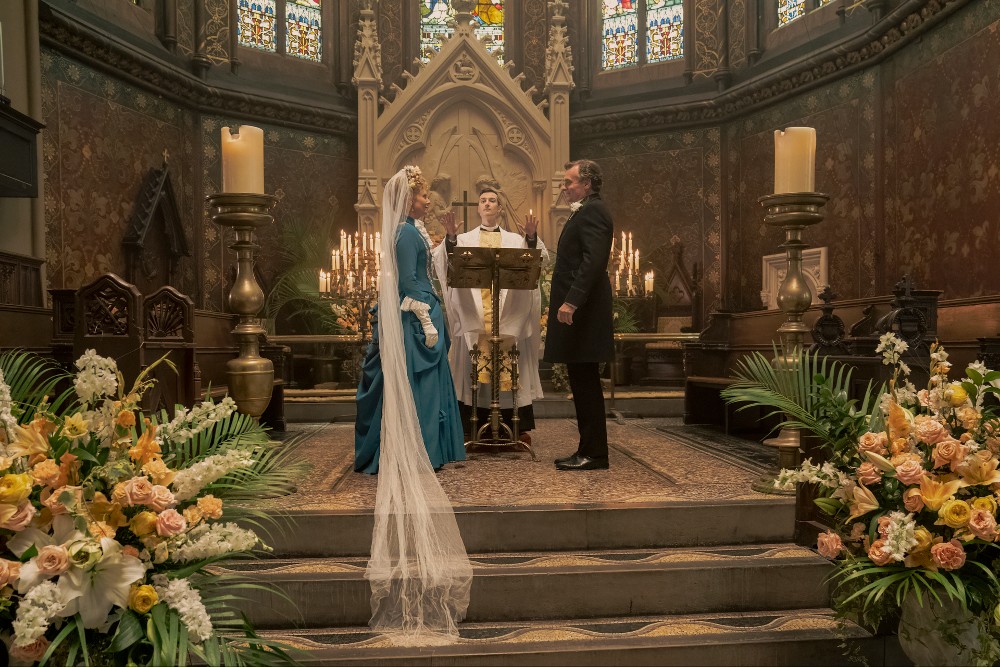
ATL: Aside from writing, what other disciplines do you enjoy?
Warfield: I see how the actors interpret what I’ve done, and then I just love to be surprised by what Kasia comes up with and what Bob comes up with. I’ve also done a little bit of music. I’ve had some influence from working with the music people. For Season Two, the scene in the church when the Reverend Forte proposes, I wanted choir practice, and I picked that hymn. In Season One, Marian (Louisa Jacobson) is with that awful Raikes fellow, and they have this moment in the park. I was writing that scene, and I remember hearing church bells that were beautiful. I said, Let’s put the church bells in there, and then he swirls her around, and they dance and have this romantic moment. I mean, it’s minimal, but that’s just those little touches.
ATL: So besides audiences looking things up in Wikipedia, what do you want them to come away with?
Warfield: We’ve deepened the relationships. If we got a Season Three, Season Three of shows usually is a sweet spot because the actors really know their characters. They’re coming into their own. The show is building, so that would be lovely and nice if everybody watched and came back and allowed us to do that.
You can stream all of Season 2 of The Gilded Age on MAX with the finale airing on Sunday, Dec. 17.


